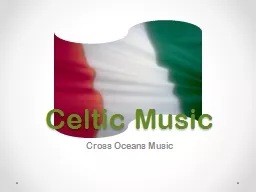PPT-An Introduction to Celtic Mythology
Author : stefany-barnette | Published Date : 2018-09-18
Mr Pratt ASTEC Charter High School Who are the Celts They were Known as the Gauls in some ancient texts The Celts were a collection of tribes that share certain
Presentation Embed Code
Download Presentation
Download Presentation The PPT/PDF document "An Introduction to Celtic Mythology" is the property of its rightful owner. Permission is granted to download and print the materials on this website for personal, non-commercial use only, and to display it on your personal computer provided you do not modify the materials and that you retain all copyright notices contained in the materials. By downloading content from our website, you accept the terms of this agreement.
An Introduction to Celtic Mythology: Transcript
Download Rules Of Document
"An Introduction to Celtic Mythology"The content belongs to its owner. You may download and print it for personal use, without modification, and keep all copyright notices. By downloading, you agree to these terms.
Related Documents














